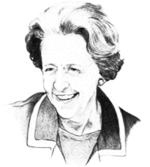- Massey Lectures
-
For the William E. Massey, Sr., Lectures at Harvard University, see Massey Lectures (Harvard University).
The Massey Lectures are an annual week-long series of lectures on a political, cultural or philosophical topic given in Canada by a noted scholar. They were created in 1961 to honour Vincent Massey, Governor General of Canada. The purpose is to "enable distinguished authorities to communicate the results of original study on important subjects of contemporary interest."[1] Some of the most famous Massey Lecturers have included Northrop Frye, John Kenneth Galbraith, Noam Chomsky, Margaret Atwood, Ursula Franklin, and Nobel laureates Martin Luther King, Jr., George Wald, Willy Brandt and Doris Lessing.
Contents
Sponsorship
The event is co-sponsored by CBC Radio, House of Anansi Press and Massey College in the University of Toronto. The lectures have been broadcast by the CBC show Ideas since 1965. Before 2002, the lectures were recorded for broadcast in a CBC Radio studio in Toronto. In 1989. and after, a single public lecture was also given at the University of Toronto. Since 2002, the lectures were taken out of the studio with each of the five lectures being delivered and recorded for broadcast before an audience in a different Canadian city.
The lectures are broadcast each November on the CBC Radio One show Ideas and published in book form by House of Anansi Press. Two consolidations of five older lectures have been published. Many of the lectures are also available in CD audio that can be purchased through the CBC. In 2011 most of the lectures were available on the Ideas website. Since 1997 the lectures have included some form of interaction through web forums.
Massey lecturers
 Barbara Ward, the first Massey Lecturer
Barbara Ward, the first Massey Lecturer
- 1961 – Barbara Ward, The Rich Nations and the Poor Nations
- 1962 – Northrop Frye, The Educated Imagination
- 1963 – Frank Underhill, The Image of Confederation
- 1964 – C. B. Macpherson, The Real World of Democracy
- 1965 – John Kenneth Galbraith, The Underdeveloped Country
- 1966 – Paul Goodman, The Moral Ambiguity of America
- 1967 – Martin Luther King, Jr., Conscience for Change
- 1968 – R. D. Laing, The Politics of the Family
- 1969 – George Grant, Time as History
- 1970 – George Wald, Therefore Choose Life
- 1971 – James Corry, The Power of the Law
- 1972 – Pierre Dansereau, Inscape and Landscape
- 1973 – Stafford Beer, Designing Freedom
- 1974 – George Steiner, Nostalgia for the Absolute
- 1975 – J. Tuzo Wilson, Limits to Science
- 1976 - No Lecture
- 1977 – Claude Lévi-Strauss, Myth and Meaning
- 1978 – Leslie Fiedler, The Inadvertent Epic
- 1979 – Jane Jacobs, Canadian Cities and Sovereignty Association
- 1980 – No Lecture
- 1981 – Willy Brandt, Dangers and Options: The Matter of World Survival
- 1982 – Robert Jay Lifton, Indefensible Weapons
- 1983 – Eric Kierans, Globalism and the Nation State
- 1984 – Carlos Fuentes, Latin America: At War with the Past
- 1985 – Doris Lessing, Prisons We Choose to Live Inside
- 1986 – Harry J. Boyle, Growing up with Canada
- 1987 – Gregory Baum, Compassion and Solidarity: The Church for Others
- 1988 – Noam Chomsky, Necessary Illusions: Thought Control in Democratic Societies
- 1989 – Ursula Franklin, The Real World of Technology
- 1990 – Richard Lewontin, Biology as Ideology: The Doctrine of DNA
- 1991 – Charles Taylor, The Malaise of Modernity
- 1992 – Robert Heilbroner, Twenty-First Century Capitalism
- 1993 – Jean Bethke Elshtain, Democracy on Trial
- 1994 – Conor Cruise O'Brien, On the Eve of the Millennium
- 1995 – John Ralston Saul, The Unconscious Civilization
- 1996 – No Lecture
- 1997 – Hugh Kenner, The Elsewhere Community
- 1998 – Jean Vanier, Becoming Human
- 1999 – Robert Fulford, The Triumph of Narrative
- 2000 – Michael Ignatieff, The Rights Revolution
- 2001 – Janice Stein, The Cult of Efficiency
- 2002 – Margaret Visser, Beyond Fate
- 2003 – Thomas King, The Truth About Stories
- 2004 – Ronald Wright, A Short History of Progress
- 2005 – Stephen Lewis, Race Against Time: Searching for Hope in AIDS-Ravaged Africa
- 2006 – Margaret Somerville, The Ethical Imagination
- 2007 – Alberto Manguel, The City of Words
- 2008 – Margaret Atwood, Payback: Debt and the Shadow Side of Wealth
- 2009 – Wade Davis, The Wayfinders: Why Ancient Wisdom Matters in the Modern World
- 2010 – Douglas Coupland, Player One: What is to Become of Us
- 2011 – Adam Gopnik, Winter: Five Windows on the Season[2]
There was no lecture in 1996 because the Ideas producers and the selected lecturer, Robert Theobald, could not agree on what constituted a sufficient manuscript for the lecture. The topic was to be on the broad theme of the future of work and it was later published as Reworking Success: New Communities at the Millennium.
References
- ^ Lucht, Bernie. "Ideas: The CBC Massey Lectures". Canadian Broadcasting Corporation. http://www.cbc.ca/ideas/masseys.html. Retrieved 2010-09-28.
- ^ "Anansi.ca: TITLES". http://www.anansi.ca/titles.cfm?pub_subid=1268. Retrieved 2011-06-21.
External links
Categories:- CBC Radio One programs
- Canadian talk radio programs
- University of Toronto
- Lecture series
Wikimedia Foundation. 2010.

